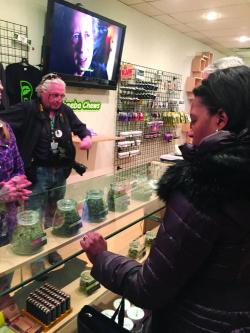January 14, 2016
 Denver trip: State Sen. Linda Dorcena Forry visits a marijuana distributor in Colorado with other members of the Senate delegation.With talk in the air of a referendum later this year to legalize marijuana for all in Massachusetts, eight state senators traveled to Colorado this week where they are taking note mission of what is happening in a state that has already legalized the drug.
Denver trip: State Sen. Linda Dorcena Forry visits a marijuana distributor in Colorado with other members of the Senate delegation.With talk in the air of a referendum later this year to legalize marijuana for all in Massachusetts, eight state senators traveled to Colorado this week where they are taking note mission of what is happening in a state that has already legalized the drug.
There is no overt push for legalization on Beacon Hill, so the senators’ mission might best be defined as a best practices fact-finding mission in case voters get a chance to say yes to the drug at the ballot in the fall.
“We’re coming here with the lens of ‘we’re not taking a position,’ but we’re trying to figure out if this does pass...we just want to be prepared,” said state Sen. Linda Dorcena Forry of Dorchester.
On their first day working out of the Colorado Health Institute, the legislators faced a packed schedule of policy briefings from those tasked with implementing cannabis-positive policies in Colorado and Washington state, Dorcena Forry said.
Among those they heard from on site were the president of the Health Institute, the executive director and chief medical officer of the Colorado Department of Public Health and Environment, and Colorado’s director of marijuana coordination. Washington state officials weighed in via teleconference.
The New York-based Milbank Memorial Fund, which describes itself as a nonpartisan foundation dedicated to connecting leaders to applicable health policy information, planned and funded the trip.
Sen. Jason Lewis (D-Winchester), chairman of the Senate’s special committee on marijuana, is leading the trip. He is joined by Dorcena Forry, John Keenan (D-Quincy), Richard Ross (R-Wrentham), James Welch (D-West Springfield), Michael Moore (D-Millbury), Viriato deMacedo (R-Plymouth), and Michael Rodrigues (D-Westport).
Colorado’s marijuana policy is a variant of the one being talked about for Massachusetts; it was made through a change to the state’s constitution and had an implementation window of just 12 months. A more appropriate comparison might be with the policy in Washington state, which is one of the four states, along with the District of Columbia, where residents voted to legalize marijuana via state law and regulations.
Marijuana for medical purposes only was approved in Massachusetts in 2012, with the first dispensary opening almost three years later. The move toward fuller legalization has gained traction here with the push for a referendum vote in November that would legalize recreational marijuana for those 21 and older. Preliminarily, it would include provisions for a new oversight commission, allow for a system of production and sale facilities, and implement a 3.75 percent excise tax on retail sales of marijuana.
Dorcena Forry said that as the week went on, they would be assessing the more practical components of legalized marijuana -- visiting a cultivation facility, touring a marijuana dispensary, seeing where the THC extractions take place that will be used in an array of products.
“When you say marijuana, some people think it’s just smoking,” said Dorcena Forry, who is married to Reporter editor Bill Forry. “But there is a whole host of products that use elements that are made out of that marijuana plant, whether it’s lotions, it’s oils, it’s so many other things.”
One product the senators found to be problematic in Colorado were marijuana treats that look like gummy bears, and bright colorful packaging that seems intended to appeal to children.
In assessing the process of legislating legalization, Dorcena Forry said that what they were hearing on the trip clarified for them the importance of starting aggressively. Washington state representatives told them, “It’s better to go strong, it’s better to have strong regulations, because you can always alter them… but if you start lax and your regulations aren’t strong, you can’t put the genie back in the bottle.”
Topics:



